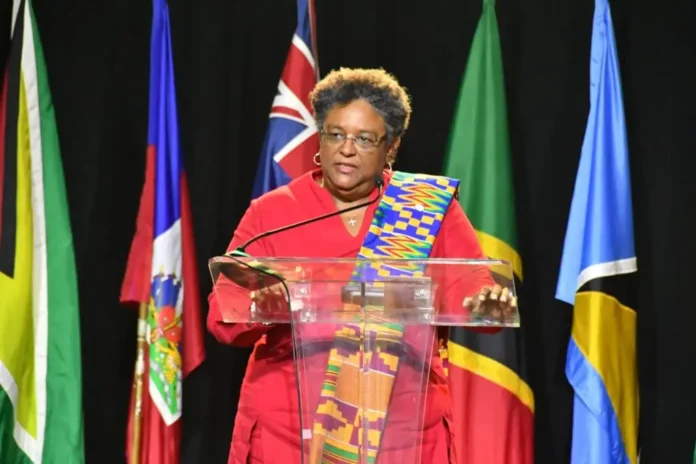
BRIDGETOWN, Barbados (CMC) – Barbados Prime Minister Mia Mottley Wednesday, urged the 56-member Commonwealth grouping to lead by example and demonstrate that democracy, even in the most trying times, remains the fairest and most effective path to peace, prosperity, and human fulfillment.
Delivering the 68th Commonwealth Parliamentary Conference Emilia Lifaka Memorial Lecture, Prime Minister Mottley said democracies everywhere now are under pressure, some from debt and distrust, from division amplified by digital rage, and from sheer fatigue.
“Yet each week offers reminders of why we endure the arguments and why we keep repairing the house. The French crisis shows the cost of fragmentation. The recognition of a Palestinian state shows the demand for conscience in statecraft.
“You may agree. You may disagree. But the point is the same. In democracies, the decision and the dissent can live under the same roof. That is why democracy remains the fairest path we have to peace and to dignity,” she said.
Mottley said it is important to work together with renewed purpose toward a future where democracy thrives, within borders and in a shared global community.
“Let us move forward hand in hand, with courage and conviction, to build a Commonwealth where democracy is not a privilege of the few, but the birthright of all,” she said. “This is not simply the work of government with the work of all of our citizens, and those of us will know better must guide and prepare to allow those who may not yet be awakened to this reality, the opportunity to join us in this battle that truly will determine whether we progress or whether we regress into the domination of countries and individuals by a few.”
“I have often said there is value in a short international frame, because our Caribbean lives are not sealed off from the wider world. We live within an international rules-based order. But context must not become a cul-de-sac. It must lead somewhere”.
She recalled the poem by the late St Lucian Nobel Prize winner, Derek Walcott, that when you break a vase, the love that reassembles the fragments is stronger than the love that took its symmetry for granted.
“Our task is reassembling. So let me move from the global to the immediate. From theory to the workbench. From principles to the practice by which we keep faith with our people,” she said, adding that Barbados and the region did not inherit “perfect institutions”.
“We built and are still building them. Barbados has chosen, again and again, to place strength in institutions rather than in individuals,” she said, making references to the policy decision taken by the Caribbean island to develop its democracy.
“What, then, does a healthy democracy look like in our practice? It is not a slogan. It is a system that yields predictable freedoms and predictable fairness,” she said, noting the importance of free and fair elections, the judicial system, rights and responsibilities with a civic culture that breathes, and information and accountability.
“Let me ground those anchors with simple pictures. An election worker who is respected by both parties because she runs a clean register every time. A magistrate who is known for listening with patience and writing with clarity. A police officer who escorts a march he does not agree with because the marchers are his people and the law protects their voice.
“A permanent secretary who knows that the numbers in a quarterly report must match the numbers at the Treasury and that the press will ask if they do not. When these habits become normal the country breathes easier, investment flows more readily, and citizens choose confidence over cynicism.”
She said it was also important to name the things that can crack the beams.
“A failure of courts to hold executives to account. A failure of citizens to recognise their power and to use it. The reach of stronger countries into the choices of smaller ones. The climate crisis disrupts the best-made plans with a single season of rain and wind.
“A global finance system that keeps the field tilted against the vulnerable. If we pretend these pressures do not exist, we will end up repairing a roof after water has already ruined the house. The discipline of maintenance is to find the leak while the rain is still falling and to fix it now.”
She said for the Caribbean, her message is simple.
“Our scale is not a weakness. It is a laboratory. We can modernise constitutions faster than continents. We can experiment with new mechanisms for judicial appointments, new charters of citizenship, and new models for independent oversight that match the reality of small societies where everyone knows everyone and conflicts of interest must be managed in the open.
“Let us export not only goods and talent, but also good governance. Let our universities, our bars, our auditors, our media houses, our churches and mosques, our community organisations become the mesh that holds our democracies in shape,” she argued.

